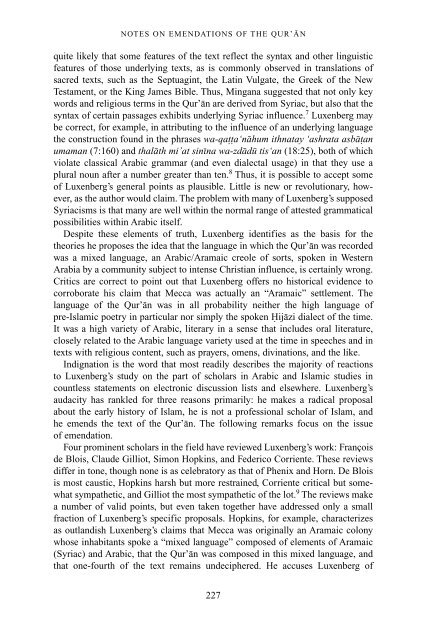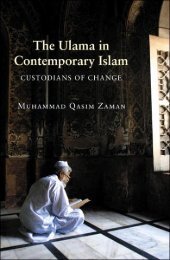The Qur'an in its historical context (pdf - Islam and Christian-Muslim ...
The Qur'an in its historical context (pdf - Islam and Christian-Muslim ...
The Qur'an in its historical context (pdf - Islam and Christian-Muslim ...
Create successful ePaper yourself
Turn your PDF publications into a flip-book with our unique Google optimized e-Paper software.
NOTES ON EMENDATIONS OF THE QUR’AN<br />
quite likely that some features of the text reflect the syntax <strong>and</strong> other l<strong>in</strong>guistic<br />
features of those underly<strong>in</strong>g texts, as is commonly observed <strong>in</strong> translations of<br />
sacred texts, such as the Septuag<strong>in</strong>t, the Lat<strong>in</strong> Vulgate, the Greek of the New<br />
Testament, or the K<strong>in</strong>g James Bible. Thus, M<strong>in</strong>gana suggested that not only key<br />
words <strong>and</strong> religious terms <strong>in</strong> the Qur’an are derived from Syriac, but also that the<br />
syntax of certa<strong>in</strong> passages exhib<strong>its</strong> underly<strong>in</strong>g Syriac <strong>in</strong>fluence. 7 Luxenberg may<br />
be correct, for example, <strong>in</strong> attribut<strong>in</strong>g to the <strong>in</strong>fluence of an underly<strong>in</strong>g language<br />
the construction found <strong>in</strong> the phrases wa-qatta‘nahum ithnatay ‘ashrata asbatan<br />
umaman (7:160) <strong>and</strong> thalath mi’at s<strong>in</strong><strong>in</strong>a wa-zdadu tis‘an (18:25), both of which<br />
violate classical Arabic grammar (<strong>and</strong> even dialectal usage) <strong>in</strong> that they use a<br />
plural noun after a number greater than ten. 8 Thus, it is possible to accept some<br />
of Luxenberg’s general po<strong>in</strong>ts as plausible. Little is new or revolutionary, however,<br />
as the author would claim. <strong>The</strong> problem with many of Luxenberg’s supposed<br />
Syriacisms is that many are well with<strong>in</strong> the normal range of attested grammatical<br />
possibilities with<strong>in</strong> Arabic <strong>its</strong>elf.<br />
Despite these elements of truth, Luxenberg identifies as the basis for the<br />
theories he proposes the idea that the language <strong>in</strong> which the Qur’an was recorded<br />
was a mixed language, an Arabic/Aramaic creole of sorts, spoken <strong>in</strong> Western<br />
Arabia by a community subject to <strong>in</strong>tense <strong>Christian</strong> <strong>in</strong>fluence, is certa<strong>in</strong>ly wrong.<br />
Critics are correct to po<strong>in</strong>t out that Luxenberg offers no <strong>historical</strong> evidence to<br />
corroborate his claim that Mecca was actually an “Aramaic” settlement. <strong>The</strong><br />
language of the Qur’an was <strong>in</strong> all probability neither the high language of<br />
pre-<strong>Islam</strong>ic poetry <strong>in</strong> particular nor simply the spoken Hijazi dialect of the time.<br />
It was a high variety of Arabic, literary <strong>in</strong> a sense that <strong>in</strong>cludes oral literature,<br />
closely related to the Arabic language variety used at the time <strong>in</strong> speeches <strong>and</strong> <strong>in</strong><br />
texts with religious content, such as prayers, omens, div<strong>in</strong>ations, <strong>and</strong> the like.<br />
Indignation is the word that most readily describes the majority of reactions<br />
to Luxenberg’s study on the part of scholars <strong>in</strong> Arabic <strong>and</strong> <strong>Islam</strong>ic studies <strong>in</strong><br />
countless statements on electronic discussion lists <strong>and</strong> elsewhere. Luxenberg’s<br />
audacity has rankled for three reasons primarily: he makes a radical proposal<br />
about the early history of <strong>Islam</strong>, he is not a professional scholar of <strong>Islam</strong>, <strong>and</strong><br />
he emends the text of the Qur’an. <strong>The</strong> follow<strong>in</strong>g remarks focus on the issue<br />
of emendation.<br />
Four prom<strong>in</strong>ent scholars <strong>in</strong> the field have reviewed Luxenberg’s work: François<br />
de Blois, Claude Gilliot, Simon Hopk<strong>in</strong>s, <strong>and</strong> Federico Corriente. <strong>The</strong>se reviews<br />
differ <strong>in</strong> tone, though none is as celebratory as that of Phenix <strong>and</strong> Horn. De Blois<br />
is most caustic, Hopk<strong>in</strong>s harsh but more restra<strong>in</strong>ed, Corriente critical but somewhat<br />
sympathetic, <strong>and</strong> Gilliot the most sympathetic of the lot. 9 <strong>The</strong> reviews make<br />
a number of valid po<strong>in</strong>ts, but even taken together have addressed only a small<br />
fraction of Luxenberg’s specific proposals. Hopk<strong>in</strong>s, for example, characterizes<br />
as outl<strong>and</strong>ish Luxenberg’s claims that Mecca was orig<strong>in</strong>ally an Aramaic colony<br />
whose <strong>in</strong>habitants spoke a “mixed language” composed of elements of Aramaic<br />
(Syriac) <strong>and</strong> Arabic, that the Qur’an was composed <strong>in</strong> this mixed language, <strong>and</strong><br />
that one-fourth of the text rema<strong>in</strong>s undeciphered. He accuses Luxenberg of<br />
227



